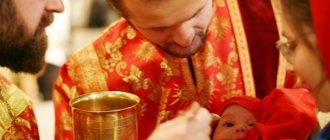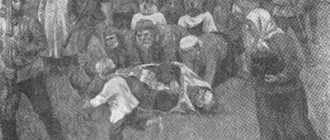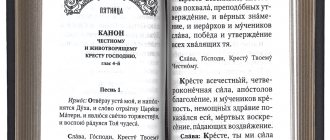How often, pursued by a serious and long-term illness, we fall into despondency and exclaim: “Why do I need this, Lord?” But the Almighty remains silent, and man begins to grumble.
Trips to doctors’ offices often end with a psychotherapist, because “the nerves are frayed,” and from the church a person heads straight to charlatans: healers, psychics and sorcerers, who claim that the person has the evil eye, damage, or is completely possessed.
Healing of the paralytic in Capernaum
Why do we bear the burden of illnesses, and is it possible to get rid of them by relying only on prayers and Holy Communion?
Examples from the Bible
The canonical texts do not contain any special discussion of diseases. However, references to bodily ailments are very numerous and are found in abundance in the Old Testament and the Apostolic Epistles. The biblical idea of illness as a punishment from the Lord is best expressed in the book of Exodus:
“If you obey the Lord your God, and do what is right in His sight, and pay heed to His commandments, and keep all His statutes, then I will not bring upon you any of the diseases that I brought upon Egypt, for I am the Lord Your healer.” (Exodus 15:26)
Here the idea is directly postulated that illness is a consequence of sin and is retribution from above. In the Old Testament texts there are names of dozens of various ailments that the Creator is free to send to a person for deviating from the commandments. So in the 28th chapter of “Deuteronomy” the following are mentioned: drought, consumption, scabs, pestilence, fever, leprosy, madness, blindness and other curses that will be sent down on the children of Israel who deviate from the will of the Lord.
Useful materials
Miriam was punished with leprosy for her slander against Moses (Num. 12:1-14), with a massive epidemic - the Jewish people for fornication with the daughters of Moab and worshiping an idol: “And those who died of defeat were twenty-four thousand” (Num. 25:1-9) . Entire cities (Sodom and Gomorrah) were destroyed for sodomy. Illness in this case is a punishment and serves as a manifestation of God’s wrath. “And the wrath of the Lord was kindled against Israel” (Num. 25:3)
In a number of Old Testament texts there are words: “sword”, “plague”, “famine” (Jer 14:12; Eze 6:11, etc.), illustrating the massive disasters that fell on people for the iniquities they committed. But God, who carries out executions, also grants life. After all, it is through illness that the Lord tries to reach a person, guide him on the true path and turn him to repentance.
Repeatedly in the psalms, the prayer for healing is correlated with a person’s confession and understanding of his own sins, for which the body suffers:
“There is no whole place in my flesh because of Your wrath, there is no health in my bones because of my sins, for my iniquities have gone beyond my head” (Ps 39:4-5).
The Book of Wisdom of Jesus, son of Sirach teaches:
“A well-bred man is content with little, and therefore he does not suffer from shortness of breath on his bed. Healthy sleep occurs with moderation of the stomach... Suffering from insomnia, cholera, and pain in the stomach occur in an insatiable person” (Sir. 31).
This describes the sin of gluttony, which causes unpleasant consequences for the body: obesity, which is associated with heart disease and problems with the gastrointestinal tract.
Those who indulge in the sin of fornication suffer from various sexually transmitted diseases, and anger contributes to the development of hypertension and neuropsychiatric diseases, because angry people are often susceptible to pressure surges and outbursts of aggression that deplete the nervous system.
“Jealousy and anger shorten the days, but care brings old age before its time” (Sir. 30).
The Book of Wisdom also tries to protect a person from vain sadness, the sin of despondency, which is accompanied by laziness, lack of faith and doubts in God. As a result, astheno-neurotic syndrome develops, anxiety and apathy appear, leading to more serious diseases - depression, neurosis and other ailments that lie in the plane of psychosomatics.
“... comfort your heart and remove sorrow from yourself, for sorrow has killed many, but there is no benefit in it” (Sir. 30).
About the “sin-disease” tables
Former Archpriest Alexy Moroz, in his writings on the origin of diseases and ways of healing, gives examples of what kind of “spiritual hole” led to a malfunction in the work of our somatics (physiology). He appeals to the works of classical and modern clinical psychologists, laying an Orthodox foundation for the science itself.
The Internet is replete with entire tables that list the diseases and sins that supposedly caused them. However, a person who has just begun to become a church member should be especially careful and not blindly trust everything that such religious authors present in their books.
Interesting fact
For example, the same Archpriest Alexy Moroz was banned from ministry on September 14, 2022 and declared a sectarian for violating church canons and openly speaking out against Patriarch Kirill and the entire administration of the Russian Orthodox Church.
However, his works are very popular online and can easily “fuss the brains” of those who are just embarking on the path of enlightenment and love for the Lord.
You should not naively believe that by not committing this or that sin, you will be freed from physical illness, addiction or psychological illness.
Is illness always a consequence of sin?
Healing of a man born blind by Jesus Christ
The New Testament gives a clear answer to this question: no, not always. Let us turn to the Gospel of John:
“And as he passed by, he saw a man blind from birth. His disciples asked Him: Rabbi! Who sinned, he or his parents, that he was born blind? Jesus answered: “Neither he nor his parents sinned, but this was so that the works of God might be revealed in him” (John 9:1-3).
The “works of God,” His power and glory, were manifested in the people whom Christ healed. A woman who suffered from bleeding for twenty years got rid of her illness, barely touching the hem of the Savior’s robe. Lazarus, who rose from the dead at the call of Christ, conquered decay. Ten lepers, the blind, those paralyzed by fever, the crippled and others were needed by the Lord, for “many, seeing the miracles that He performed, believed in His name (John 2:23).
The suffering of the righteous
There are people whom the Lord chooses to serve him in order to show through them the strength and triumph of faith. Without their physical suffering and torment endured for Christ, they would not have become those indestructible pillars of spirit and piety that support hundreds of Christians on the difficult path to God.
We are talking about the illnesses of the righteous, which cannot be considered either punishment or punishment. The most striking example of a test of faith is the biblical Job. According to Scripture, God and the Devil argued among themselves about Job, a righteous, rich and happy man. Will he be able to continue to remain faithful to his God if mercy does not come from heaven?
And so Job loses everything: property, position in society, friends, family, his own health, but not his faith. “Curse God and die” (Job 2:9), his wife advises him. And the friends who came try to convict him of hiding secret sins, calling on him to repent and thereby be saved from punishment. Job's suffering was great, but so was his reward. The Lord returned Job's lost wealth and extended his days.
Even the Apostle Paul, a zealous planter of the Word of God in the lands of Asia Minor and the Balkan Peninsula, did not escape a sad fate. In Second Corinthians he exclaims:
“...a thorn was given to me in the flesh, an angel of Satan, to afflict me, so that I would not become arrogant. Three times I prayed to the Lord to remove him from me. But the Lord said to me: “My grace is sufficient for you, for My power is made perfect in weakness.” Therefore, I will boast all the more gladly about my weaknesses, so that the power of Christ may rest on me. Therefore, I am content in weaknesses, in insults, in needs, in persecutions, in oppressions for Christ’s sake, for when I am weak, then I am strong. (2 Cor.12:7-10).”
It is not known exactly what kind of illness beset Paul and what exactly its nature was, but from the words of the missionary we see that the illness saved the saint from pride. Like the other apostles, Paul was endowed with the gift of healing, and due to his strength he could fall into temptation and become conceited. Understanding this, the saint willingly accepts weakness as a mercy shown for the salvation of his soul.
Thus, based on biblical texts, the following causes of illness can be identified:
- Disease as a manifestation of the mortal nature of fallen humanity.
- Illness as a punishment for breaking the commandments.
- Illness as a call to repentance and rethinking one’s life path.
- Illness as a test of fidelity.
- Illness as an atoning sacrifice.
The latter was realized in its entirety through the voluntary suffering and death of the Savior on the cross.
Examples of saints who endured severe infirmities during their lifetime
Among Christian saints there have always been people who today would be called disabled.
The Monk Ambrose of Optina, the great ascetic of the Russian land, from the age of 35 suffered from diseases of the gastrointestinal tract: pain, vomiting, bloody diarrhea. He could not participate in worship services; he walked with a cane and lay down a lot.
It is amazing how courageously he endured his illness, without losing faith in the mercy of the Lord, and at the same time caring for many spiritual children. From his correspondence with the latter, we see how the saint treated his illness:
“..For patiently enduring illness, both mercy and forgiveness of sins are granted.”
“God does not require physical feats from the sick, but only patience with humility and gratitude.”
Devotion to the will of God is always necessary and useful for us, but in illness it is even more necessary. Then only we can be calm and can maintain faith and trust in the mercy of God, which saves sinners who repent and humble themselves together, like the tax collector who was not angry with the Pharisee who humiliated him.
Man’s anger does not create God’s righteousness (James 1:20), since an angry disposition is even more harmful to a sick person. It is always useful to remember and say to the Lord the words from the psalm of David: It is good for me that you have humbled me (Ps. 119:71). And at other times -
“All this is worthy and righteous; I suffer for my sins.”
Blessed Matrona of Moscow, now revered by millions of believers, was born blind, and at the age of 17, she also lost her legs. Throughout her long life, the saint bore her cross without complaint, for which she was awarded the gift of insight and healing. There is a legend that the passion-bearer foresaw her illness.
Her trust in the Lord was limitless:
“They carry the child on a sled and there is no care for him. The Lord Himself will arrange everything!”
Saint John Chrysostom, one of the three Ecumenical Teachers, had poor health since childhood. In his youth, having embarked on the path of asceticism, he retired to the desert and lived in a damp cave for two years. From there he suffered from fever and gastrointestinal illness, from which he suffered until his death. Despite his poor health, he managed to engage in the affairs of the Church, write interpretations of the Gospels and Apostolic Epistles, and at the same time endured great persecution from all sides.
“God often allows you to fall into illness, not because He has abandoned you, but in order to glorify you more.”
“Illnesses also happen to test us in goodness.”
The Monk Anthony of Optina, the monastery leader of the Optina Hermitage, suffered from leg disease for about thirty years. The calves, covered with bleeding wounds, caused the elder the most severe suffering. For almost six months he could not leave his cell, and then, although the illness weakened, it did not let go of the righteous man until his death. The pilgrims who met him did not even suspect what kind of suffering the Monk Anthony was suffering, for his face was always smiling and bright.
“Body illness serves to heal the soul; we cannot boast without having it. Glory and thanksgiving to the Lord, who heals us with tart guidance!”
In his letters, the elder taught to attribute illness to the will of God, which wants man to be saved:
“When I was going through your letter again, I noticed in it your cowardice about your illnesses. You write that the Lord does not visit you with illnesses out of love, but punishes you for sins, and if you knew that it was out of love, you would better endure it. How is it possible that God does not visit you out of love? What if the punishment itself comes from the love of God? Read in the Epistle to the Hebrews in the 12th chapter: For the Lord loves him and punishes him, and beats every son whom he accepts.”
With all this, neither the Holy Scriptures nor the Holy Fathers, respectively, denied the need to seek medical help. After all, the Lord often works miracles of healing precisely through the hands of doctors. Saint Luke, Archbishop of Crimea, was a surgeon, and Saint Panteleimon the Healer is depicted on icons with a casket filled with medicines - a direct analogy with the medical ministry of the saint, which he carried out during his lifetime.
How to relate to the book by Pechenkin A.I. "Sins-Diseases"
Alexander Ivanovich Pechenkin is one of the religious writers who combined in his works scientific, religious and esoteric teachings about God, nature and man.
In particular, in the book “Sins-Diseases,” the author claims that any illness in a person (be it physical or mental) is caused by the presence of destructive energy in the body, which is a response to a person’s negative thoughts and actions. Thought is material, the author emphasizes, because man is created in the image and likeness of God - by the creator, which means he can, with the help of the energy contained in thoughts and desires, create either evil or good. Negative emotions: anger, anger, resentment, envy, released out, then return like a boomerang in the form of diseases.
“What energies a person creates in his actions, both on the mental level, as well as on the physical level, is what he will receive in the future, both in this earthly life and in the next incarnation,” says the author.
Pechenkin constantly turns to the Holy Scriptures, deftly interpreting quotations from the Bible in the interpretation that the author needs to reinforce his beliefs.
However, the contents of the book absolutely do not correspond to the teaching of the Orthodox Church on the nature of sin. “...you cannot make a single hair white or black,” says the Gospel of Matthew, hinting that a person is powerless to influence events unless it is the will of God. In the book of Lamentations of Jeremiah, the Lord asks the prophet:
“Why do you cry about your wounds, about the cruelty of your illness? Because of the multitude of your iniquities I have done this to you, because your sins have multiplied” (Jer. 30:15).
According to Pechenkin, man is the creator of his own destiny.
Further, the author talks about some “other incarnations,” which is generally nonsense for the Orthodox religious concept. Not at all embarrassed to quote Christ, Pechenkin immediately drags in here the wheel of Samsara - the concept of the cycle of rebirth, entrenched in Indian religious philosophy and Buddhism.
In this sense, Pechenkin strongly resembles Tolstoy - both of them in their worldview melted down the doctrines of all kinds of religious teachings, subjecting canonical texts to semantic revision and throwing out from them everything that seemed unnecessary and superfluous to the authors.
Thus, Pechenkin’s book “Sins-Diseases” is an absolute heresy from the point of view of the Russian Orthodox Church.
***
And when you make a mistake and fall again, repent again. Don't despair, find courage and hope within yourself. Say: “Forgive me, my Christ, I repent again!” Do not say: “I am destined for the wrath of God.” Isn't it a sin? Humans are.
Elder Joseph of Athos
Photo: A. Kamaldinov/Orthodoxy.Ru
In the parable of the talents (see Matt. 25:14-30), the master distributes talents to his slaves, to some five, to others two, to others one, to each according to his strength, and asks them to use them in their work. To put it simply, in our language, this is some kind of financial transaction, perhaps a banking operation, in which a person must invest money and receive a bank interest on it.
This operation is quite risky: if you invest in the wrong place, you will be deceived. You can lose all your money, but you can also gain something if you do the right thing.
By distributing money to his slaves, the master understands that he is taking a risk. A certain amount of risk is inherent in every financial transaction. Investments may bring profit, but there may also be losses.
The parable does not say directly, but one can understand that the master gives his slaves the right to make mistakes and lose this money. But he does not give them one single right - to bury this money.
Mister! I knew you that you are a cruel man, reaping where you did not sow and gathering where you did not scatter (Matthew 25:24), says the slave to the master. This is the consciousness of people who are afraid to live and act like Christians. “How can I undertake this matter if I have to answer for it at the Last Judgment! How can I help my loved ones or pray for them... How can I take the trouble to care for the old lady, and what if I can’t? What if I don't pull it? How then to answer before the Lord? Yes, I’d rather not do anything at all!”
We advise you to study Prayers to St. Nicholas the Wonderworker for good luck and luck
But is the Lord a cruel man? Answering this, the Lord says: “It’s only because you were afraid to live, you didn’t even want to try to do something, you were afraid, that’s what I will judge you for, you lazy and crafty slave, and not because you lost If you had this money, you might not have saved it.”
This is what happens to us most often: the Lord gives us talents, but we do not keep them. The sacrament of confession has as its goal the reconciliation with the Lord of a person who did not preserve his talents, did not bury them, and precisely did not preserve them. He was given the opportunity to use them, but he could not do this due to his stupidity, his clumsiness, his inability, his frivolity, for any reason, simply due to his sinfulness. He lost them, but he didn't bury them. And therefore he has the opportunity to be reconciled with God through confession.
But for a person who has buried his talents, confession as a sacrament may not take place, because he is not guilty of anything before God. An internal protest against God, as against a cruel person, whom you fear, whom you tremble only because you will have to answer for your mistakes, does not give a person the opportunity to confess his sins, even if he often comes to confession.
But let us remember what the Lord says to Cain before he prepares to kill Abel. He says: Sin lies at the door; he draws you to himself, but you have dominion over him (Gen. 4:7).
Archpriest Alexy Uminsky, The Mystery of Reconciliation (chapters from the book)
Can a person always find out exactly why he was sick?
Life itself gives the answer to this question. Girls who have not yet known men and are not guilty of the sin of adultery suffer from female diseases, and in queues to see a gastroenterologist it is not fat people who line up, but rather, on the contrary, extremely thin people... The ways of the Lord are inscrutable, and sometimes we have no choice but to simply humbly accept your fate.
Trying to figure out the sin that, according to the understanding of the sick person, led him to this state, a person risks only aggravating the disease with vain toils, endless lamentations and self-criticism. A person broken down by illness begins to grumble, blaming God for his misadventures, and then completely turns away from Him.
As mentioned above, not every illness is retribution for what has been done. Perhaps, by confining himself to a physical or mental illness, the Lord thus prevents a person from doing terrible things that he could do if he were healthy.
“There are diseases, the healing of which the Lord imposes a ban on when he sees that illness is more necessary for salvation than health,” says Theophan the Recluse.
Therefore, “if doctors do not help or the doctor has not correctly identified the disease and the disease does not stop, then do not rush to recklessly consider this or that circumstance as the reason for the failure of treatment and do not look for other reasons for this, except that God does not want me to recover, or He want to continue my illness... And when [the patient], after using many healing remedies, does not receive recovery, then he can be sure that it is God’s will that he endure a very long and severe illness,” St. John of Tobolsk echoes his thoughts .
They say that the Lord never gives to a person beyond his measure. But the question of why there are so many suicides in the world remains open...
Does the Lord send diseases?
The Creator places a person in those situations that are most useful for his salvation. Consequently, God does not send illnesses, but allows them. For example, a person mired in vices and everyday problems, falling ill, gets the opportunity to think about something more important than worldly life. This situation often contributes to spiritual development and work on oneself.
Many holy fathers saw people who, through bodily suffering, were freed from sins and passions. Theophan the Recluse said that for some sick people, illnesses served as protection from troubles that they would have gotten into if they had good health.
Purple hair is the dream of mysterious beauties: a selection of spectacular images
“I am a highly paid specialist”: Volodina announced the cost of an hour of consultation
You can also have sweets: a nutritionist said that it’s not harmful to eat sweets in the morning
Is it possible to pray for healing and how to do it
Archpriest Sergiy Pravdolyubov, rector of the Church of the Life-Giving Trinity in Trinity-Golenishchevo, says that “one can and should turn to God with a request for recovery.”
However, when the body is exhausted by a long-term serious illness, it is very difficult to pray. After all, the spirit in us fades away, and at the same time faith. We turn to the words of the holy fathers, the Bible and go to a priest for an interpretation of our condition. But we hear nothing but standard expressions: “pray sincerely, take communion, confess your sins.” In such a state, it is generally difficult to tune in to prayer and even read the “Our Father,” let alone an akathist or defend a service in church.
We are constantly plagued by the question: “Why? For what? When will this end? But, alas, the more we resist our condition and the will of God, the more likely the outcome is that this will never end at all. We have one path - humility. Reverend Ambrose o
And the shortest prayer that our brain can perceive and master at such a time is: “Lord, save and have mercy!” can happen many times during the day and sleepless night.
Now there are many audio recordings of church chants, psalms and prayers. You can simply turn them on and listen, and in moments of relief, begin to pray yourself. You should not beat yourself up by increasing your daily prayer rule. The point is not in the number of prayers, but in their quality.
It is also important to understand why you are asking the Lord for healing. It has been repeatedly said above that God allows us illness in order to lead to salvation. By sending us an illness, He wants us to leave the life that led us to this illness, and in the future live, serving the Lord, each in his own field. Most people, according to Archpriest Alexy Potokin, do not think about this. The priest exaggeratedly reduces the desire to be healed to the following formulation:
“Lord, give me a breath of air so I can get a little more excited.”
According to the priest, simply praying for health in order to return to the previous meaningless existence is like asking for money to drink away.
Christ often said when a person was freed from illness: “Your faith has saved you.” Therefore, “according to your faith, be it done to you” (Matthew 9:29).
Galina Bocharova
Diseases do not always visit sinners
Hieromonk Job (Gumerov) argued that serious illnesses often occur among the righteous.
Breakfast porridge, dental floss: Changes in daily routine reduce risk of dementia
Kirill Zaitsev spoke about perfectionism, bloody calluses and personal life
How to quickly and easily remove stains from jeans from upholstery: simple instructions
This is how the Lord shows concern for their spiritual purity.
One old man, who was overcome by illnesses, did not get sick for a whole year. This upset the righteous man. The elder said that God had abandoned him.
It happens that, with the permission of the Almighty, demons send serious illnesses to the righteous. For example, Saint Job the Long-Suffering endured all his trials without complaint. For this, God gave him the crown of martyrdom.








